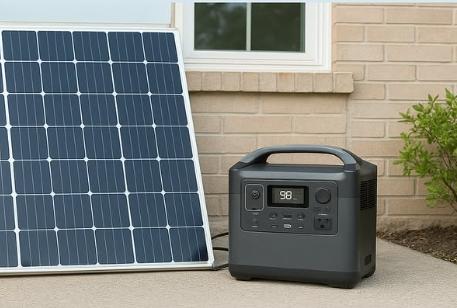As energy costs continue to rise, more homeowners are looking into sustainable alternatives like solar generators. These devices offer a clean, reliable way to power your home while reducing carbon footprints. From understanding the functioning of solar generators to installation tips, this guide covers everything you need to make an informed choice.

Understanding Solar Generators
Solar generators are compact systems that convert sunlight into electricity and store it for later use. They typically consist of solar panels, a solar battery, a charge regulator, and an inverter. These components work together to capture solar energy, regulate its storage, and convert it into usable AC power for household appliances. Unlike conventional gasoline generators, solar generators are quieter and produce no emissions, making them a more environmentally friendly choice for home use.
For a detailed breakdown of how solar power generators work, you can visit Renogy's comprehensive guide.
Types of Solar Generators
Solar generators come in several types, primarily categorized by their capacity and intended usage:
- Portable Solar Generators: Ideal for camping and outdoor adventures, these are compact and easy to transport. They can power small devices like phones, laptops, and lights.
- Backup Solar Generators: Designed for homes, these provide power during outages. They can support larger appliances like refrigerators and are suitable for semi-long-term use.
- Whole-House Solar Generators: These are larger systems designed to power an entire home. They are integrated into your home’s electrical system and are best for those looking to offset a significant portion of their energy consumption.
For insights into solar generator options suitable for different needs, take a look at EcoFlow's guide to the best solar-powered generators.
Benefits of Using Solar Generators at Home
The advantages of using solar generators at home are considerable:
- Eco-Friendly: Solar generators reduce dependence on fossil fuels and help decrease your home's carbon footprint.
- Cost-Effective: Although the initial investment can be high, solar generators save money in the long run through reduced or eliminated electricity bills.
- Reliability: These systems provide consistent energy access, particularly beneficial during grid outages or in remote locations.
- Quiet and Low Maintenance: Without moving parts, they operate quietly and require minimal maintenance.
Factors to Consider When Choosing a Solar Generator
When selecting a solar generator, consider the following factors:
- Capacity: Determine your energy needs to choose a generator with adequate storage and output capacities.
- Portability: Decide if you need a portable option or a more permanent installation.
- Run Time: Evaluate how long the generator can continuously supply power before needing a recharge.
- Durability and Warranty: Consider the build quality and check if the manufacturer offers a robust warranty.
For more detailed selection criteria, visit Oupes' complete guide to selecting the best solar generator.
Popular Brands and Models
The market is flooded with various brands offering top-notch solar generators. Some popular options include:
- Goal Zero Yeti Series - Known for versatility and durability.
- Jackery Explorer Series - Praised for portability and affordability.
- EcoFlow Delta Series - Offers fast charging and high-power capacity.
- Maxoak Bluetti Series - High-capacity generators that are reliable for home backup.
To explore further options, read BioLite Energy's adventures in solar generator options.
Installation and Maintenance Tips
Installation
Installing a solar generator can be straightforward if you follow these steps:
- Position Solar Panels: Install panels in a location with maximum sun exposure.
- Connect Components: Ensure all components are correctly connected to avoid power loss.
- Professional Installation: Consider hiring professionals to handle complex installations, especially for whole-house systems.
Maintenance
Maintaining your solar generator is easy with these habits:
- Regular Cleaning: Keep solar panels free of dust and debris to maintain efficiency.
- Battery Check: Regularly inspect battery health and charge cycles.
- Software Updates: If applicable, keep firmware of electronic components up to date.
Having learned about solar generators, take a moment to explore a comparison of some popular models. This table provides a snapshot of various options, helping you choose the best solar generator for your needs:
| Brand | Model | Price (USD) |
|---|---|---|
| Goal Zero | Yeti 3000X | $3,199 |
| Jackery | Explorer 1000 | $999 |
| EcoFlow | Delta Max | $1,899 |
| Maxoak | Bluetti AC200P | $1,799 |
| Biolite | BaseCharge 1500 | $1,699 |
Investing in a solar generator is a forward-thinking decision with both economic and environmental benefits. By understanding your energy needs, the types of generators available, and following proper installation and maintenance practices, you can ensure a seamless transition to renewable energy.



